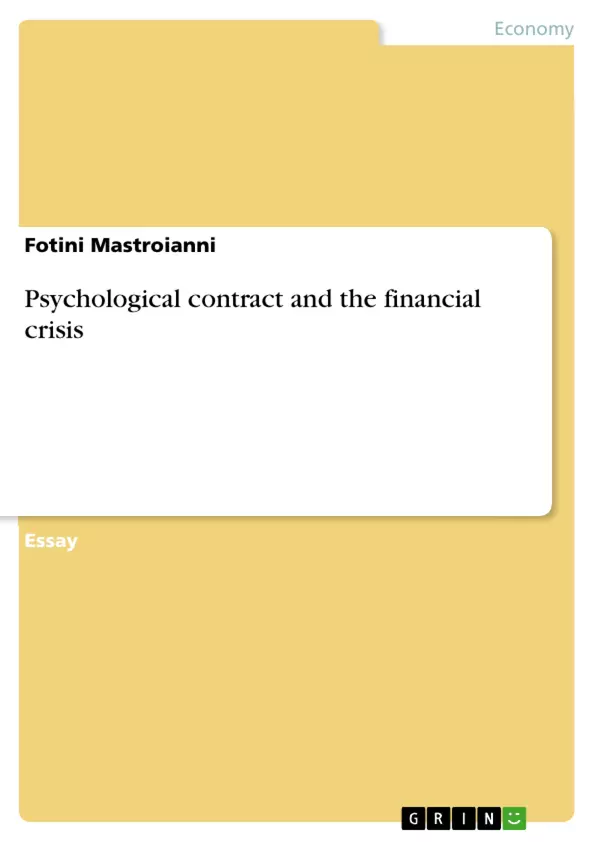A key example of drastic change in today's global working environment with important consequences for employees since the diversification of all aspects of work is the transformation of the "psychological contract" among employees and their organizations. As such "psychological contract" is defined by Rousseau (1995) as "the belief that a person for the terms and conditions of a mutual agreement transaction between him/her and another participant, in this case between the employee and the organization". More specifically, the term "psychological contract" refers to mutual obligations, values, expectations and desires of employees from their employers, beyond any formal employment contract.
In other words, it is a transaction relationship, where employees and employers have certain expectations about their mutual obligations, which are, of course, different for each employee and significantly affect what each side believes is its obligation. The psychological contract has been characterized in a various ways, for example, as "unstable, subjective, unconscious, indirect, alive, something that employees know it exists, only when it is changed" (Appelbaum et al.).
Inhaltsverzeichnis (Table of Contents)
- Introduction - Psychological Contract
- Nursing Profession - Characteristics
- Greek reality - Researches on public health care employees
- Nursing Psychological Contract - International Research
- Reference List
Zielsetzung und Themenschwerpunkte (Objectives and Key Themes)
This work aims to explore the concept of the psychological contract in the context of the nursing profession, particularly in relation to the changing nature of work and its implications for employee well-being. It examines how the traditional psychological contract, characterized by stability and security, has been transformed in modern working environments.
- The evolution of the psychological contract in the workplace.
- The impact of changing work conditions on employee satisfaction, motivation, and trust.
- The specific challenges faced by nurses in relation to the psychological contract.
- The relationship between the psychological contract and burnout in the nursing profession.
- The role of ideological factors in shaping the psychological contract.
Zusammenfassung der Kapitel (Chapter Summaries)
- Introduction - Psychological Contract: This chapter defines the concept of the psychological contract and explores its historical evolution. It discusses the different types of psychological contracts, including transactional, relational, balanced, and transitional, and examines the factors that contribute to their formation and breakdown.
- Nursing Profession - Characteristics: This chapter examines the unique characteristics of the nursing profession, focusing on the demanding nature of the work and its potential impact on employee well-being. It discusses the concept of burnout and its prevalence among nurses.
Schlüsselwörter (Keywords)
The key concepts and themes explored in this text include the psychological contract, employee relations, work-life balance, burnout, job satisfaction, motivation, trust, ideological factors, and the nursing profession. The text draws on various research perspectives and studies to analyze the evolving nature of the psychological contract in contemporary workplaces, with a particular focus on the nursing profession.
Frequently Asked Questions about Psychological Contracts
What is a 'psychological contract' in the workplace?
It refers to the unwritten mutual obligations, values, and expectations between an employee and an employer, beyond the formal employment contract.
How has the psychological contract changed in modern times?
The traditional contract of stability and long-term security has shifted towards a more transactional and flexible relationship due to global economic changes.
How does the psychological contract affect nurses?
In the nursing profession, a breach of the psychological contract is often linked to high levels of stress and burnout due to the demanding nature of the work.
What is the difference between a transactional and a relational contract?
Transactional contracts focus on short-term economic exchange, while relational contracts involve long-term emotional investment and loyalty.
Why is trust important for the psychological contract?
Trust is the foundation of the agreement; if expectations are not met, trust is lost, leading to decreased job satisfaction and motivation.
- Quote paper
- Fotini Mastroianni (Author), 2012, Psychological contract and the financial crisis, Munich, GRIN Verlag, https://www.grin.com/document/353378



